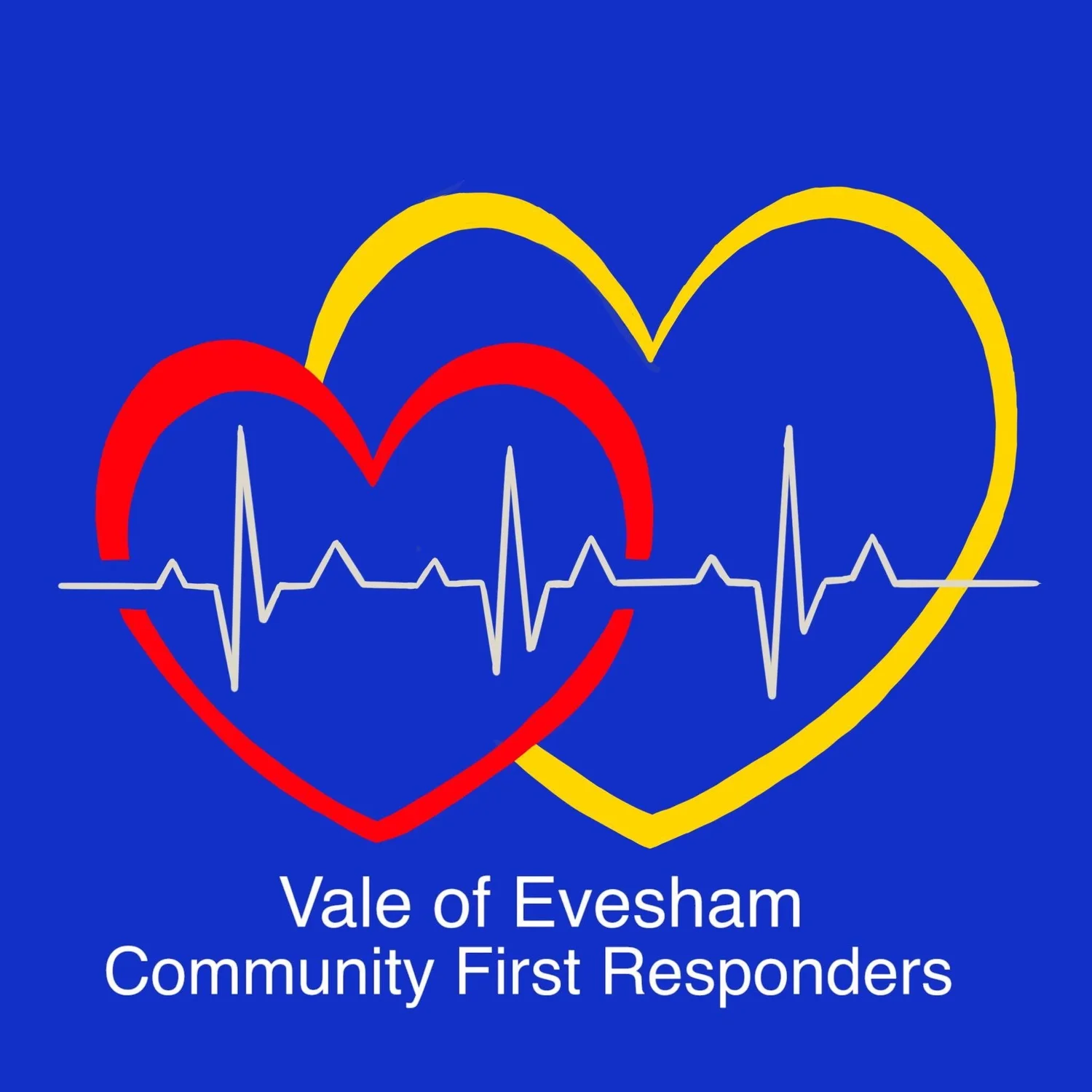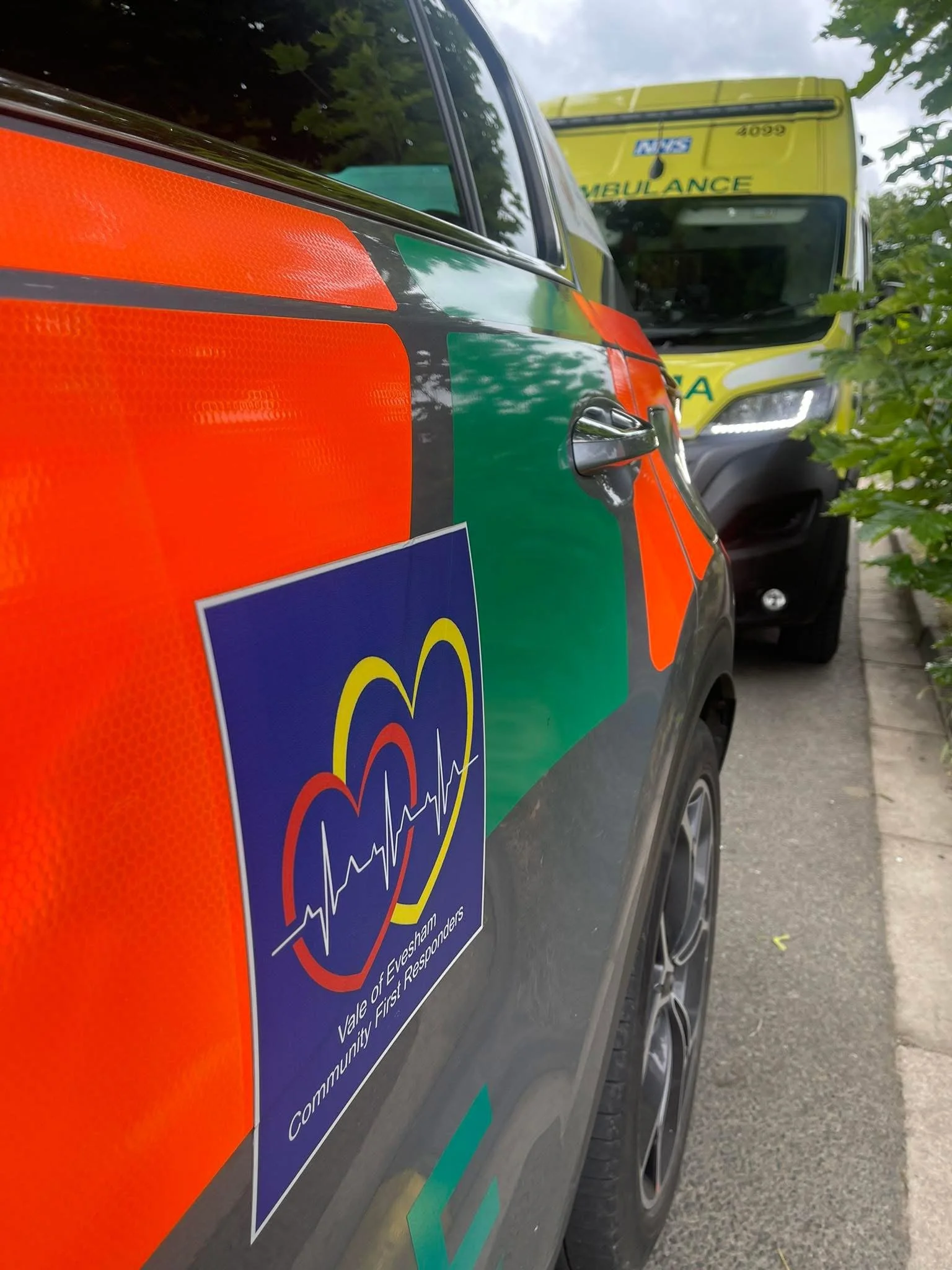On this page:
About our charity
The Vale of Evesham Community First Responders is a registered charity, UK registration number 1132496.
The charity was first set up by a group of volunteers in 2009, working alongside the then Hereford and Worcester Ambulance Service. Back then, First Responders used their own vehicles to travel to emergencies, and were contacted via a mobile telephone. Signs were provided to identify their vehicles as being used for an emergency response, however they were still required to observe all traffic regulations and speed limits. Fast forward to today, the training has improved to keep pace with modern medicine, and all responders now use a liveried response car - however these have no blue lights or sirens, and all responders are still required to observe speed limits and traffic regulations.
Did you know?
WE ARE NOT FUNDED BY WEST MIDLANDS AMBULANCE SERVICE OR THE NHS
0% of the funding for our scheme is provided by either the ambulance service or the NHS. We feel we need to make this clear as many people we interact with are often under the impression that we must at least get some funding towards our equipment or running costs.
We have substantial operating costs despite all of the team being volunteers. The charity has to provide uniforms, ID badges, equipment bags, vehicle insurance and maintenance costs, fuel costs (apart from mileage to an actual incident which will be reimbursed by WMAS) and any consumables required for CPR training.
We rely 100% on support from our local communities. If you would like to help, please CLICK HERE. Thank you.
What is a Community First Responder?
CFRs are unpaid volunteers who are trained by West Midlands Ambulance Service. They respond in their spare time to 999 calls within their local community and provide immediate treatment until an ambulance arrives. For life threatening situations every minute counts towards increasing the chance of survival. In the total West Midlands Ambulance area there are currently more than 500 active CFRs.
CFRs join local charities called schemes which work in partnership with West Midlands Ambulance Service. These schemes allow CFRs to volunteer using a marked response car (without blue lights) in their local community without needing to travel to their nearest ambulance hub. In addition to responding to 999 calls, they also spend time raising awareness of life saving skills such as CPR and fundraising to cover the cost of running their scheme.
What type of 999 calls do CFRs respond to?
Every 999 call that is received by West Midlands Ambulance Service is triaged or sorted, to decide what is the most appropriate response to your call. All 999 calls are categorised to ensure patients in the most serious condition receive the fastest response. CFRs are dispatched to the two most urgent categories:
Category 1 calls – life threatening situations e.g. where a patient is not breathing, they are having a severe allergic reaction, they are having a seizure or significant blood loss
Category 2 calls – situations that could become life threatening if not dealt with urgently e.g. chest pain, difficulty breathing, strokes or major burns
All of our volunteer responders are based within the community, and will respond to emergency incidents within a 10 mile radius of their location, however in many cases they may only be a few minutes away from a medical emergency and be able to provide vital reassurance to patients and their families until the ambulance crew arrives. In extreme cases, such as cardiac arrests, they can start potentially life saving treatment such as CPR and use of a defibrillator.
Types of incidents and medical emergencies we attend may include:
Cardiac Arrest
Heart Attacks
Strokes
Anaphalaxis
Traumatic Injuries
Choking
Breathing Difficulties
Unconscious patients
Epileptic seizure
Asthma
Diabetic Emergencies
Road Traffic Collisions
Poisoning
Burns & Scalds
Bleeding
What are CFRs trained to do?
All CFRs are trained by West Midlands Ambulance Service to the nationally recognised Level 3 First Responder On Scene (FROS) syllabus which covers everything they will be expected to do when responding to a 999 call including:
Scene management:
Safety & triage
Current legislation, national guidelines, policies & procedures for undertaking casualty assessment and examination
Communicating with patients & relatives
Safe moving & handling
Primary & secondary surveys
Skeletal stabilisation
Life support:
Perform basic life support for adults, children and babies
Use of oropharyngeal airways and bag valve masks
Automated external defibrillation
Post resuscitation procedures
Medical assessment:
Pulse and respiratory checks (eg blood pressure, pulse oximetry, temperature)
Patient positioning
Recognition of respiratory problems
Common breathing difficulties
Basic airway management (eg blocked airways, choking, suction, use of oxygen)
Recognition and initial care of medical conditions (eg heart attack/angina, diabetes, stroke, epilepsy, unconscious patients, asthma/anaphylaxis)
Recognition and initial care of extreme temperatures, poisoning, injuries to bones & joints, burns & scalds, bleeding, shock & faints and other trauma related injuries
What is expected of a CFR?
Once qualified, volunteers CFRs will be affiliated with their local scheme and will be expected to:
Respond for a minimum of 208 hours per year (equivalent to 4 hours per week) whenever it is convenient for you – there are no set shift durations or schedules and you can choose to respond on your own or with other CFRs
Teach people in your local community how to perform cardiopulmonary resuscitation (CPR), use a defibrillator and stop severe bleeding
Help your local scheme fundraise to cover the cost of your uniform, response car and equipment (West Midlands Ambulance Service only covers the cost of consumables and mileage when attending 999 calls)
How do I become a CFR?
Entry requirements
West Midlands Ambulance Service has CFRs across the West Midlands region. CFR applicants don’t need any prior knowledge or training but should have a good all-round education and:
Are aged 18+
Have held a valid driving license for at least 12 months with no more than 3 penalty points (most schemes require a manual license though some use automatic cars)
Are physically fit
Have a caring nature
Have good communication skills
The recruitment and training process
The first thing you might want to do is to get in touch with your local CFR scheme. They will be able to explain how the scheme operates, give you the opportunity to meet the team and ask any questions you may have. Once you’ve decided if you want to be a CFR, you will need to apply when vacancies are open. Here are the recruitment and training steps to become a CFR:
Apply online via NHS Jobs
Attend an online interview
If successful, you will then need to complete a Criminal Records Declaration form, occupational health assessment, an enhanced DBS check (free of charge) and provide two references
Attend a 6 day training course at the National Ambulance Academy at Sandwell Hub (these are held throughout the year as either 1x Monday to Saturday or 3x Saturdays & Sundays) and include two theory tests and five practical assessments
The final step is to put your training into practice – this is done by responding alongside an experienced CFR from your local scheme for at least 16 hours where you will learn where everything is stored in the kitbag, how to book on/off using the radio, how to accept and clear from jobs on the dispatch system, how to fill out patient report forms, and attend at least one 999 call where you can put everything you’ve learned into practice.







